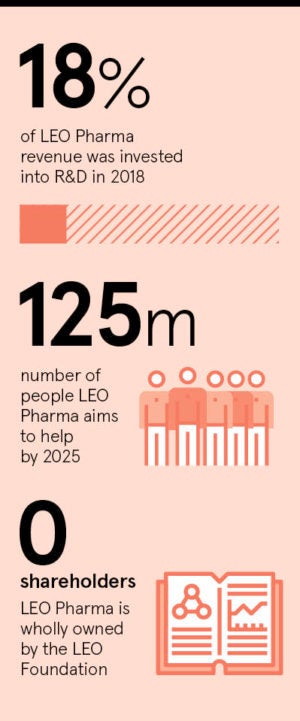Global research, conducted by the LEO Innovation Lab and the Happiness Research Institute, found that 37 per cent of the two million people living with psoriasis in the UK are living in misery, while societal understanding of its debilitating impact remains poor.
Psoriasis costs the UK economy £1.07 billion a year in lost productivity and its sufferers have elevated risks of cardiovascular disease, diabetes, obesity and a range of immune system conditions, facts that can be overlooked when prioritising services and approaches to care.
GPs provide more than 13 million consultations for skin conditions a year at a cost to the NHS of £723 million, yet it is rarely an area of strategic focus and GPs may have spent less than two weeks of their medical school training learning about its intricacies.
But a groundswell of academic opinion and an increasingly louder patient voice are aiming to move psoriasis out of the shadows and into a clearer light where its physical, emotional and financial burden can be fully appreciated, and significant advances in treatment in recent years can be more easily connected to patients in need.
One third of people with psoriasis have not had an annual review with their GP for five years
The pressing challenge is to promote greater awareness across society and healthcare, particularly where there are existing myths and misconceptions, for example that psoriasis is contagious. Insights gathered by LEO Pharma, a pioneering medical dermatology company, detail the wide-ranging discrimination people living with skin conditions can experience. Some have been ordered out of public swimming pools and one person even suffered the embarrassment of seeing the next customer at a cash machine cleaning the keyboard with a sterile wipe.
“Many people are affected in their personal and professional lives by dermatological conditions, but they are often seen as ‘just skin conditions’ when, in fact, the conditions are so much more,” says Dr Sathish Kolli, medical director of LEO Pharma, which is backed by decades of research and development in medical dermatology and patient advocacy. “For example, psoriasis is an immune mediated condition that is associated with a number of comorbidities, which may require specialist help.
“One of the saddest aspects that people living with psoriasis face is that many are poorly served, which conspires to make them resigned to their condition and not seek help, including holistic care from a healthcare professional when they need it. One third of people with psoriasis have not had an annual review with their GP for five years.”
 LEO Pharma has more than 80 product labels across the UK and Ireland, and its robust pipeline includes topical, biological and oral treatments. LEO Pharma is helping 76 million patients in 130 countries and aims to reach 125 million people by 2025. The company, which reinvests 18 per cent of revenue in R&D, is a wholly owned foundation, giving it the freedom to put patients, not shareholders, first. Some of these patients are playing a significant role in sharing their personal insights to support the development of new resources and therapies with LEO Pharma.
LEO Pharma has more than 80 product labels across the UK and Ireland, and its robust pipeline includes topical, biological and oral treatments. LEO Pharma is helping 76 million patients in 130 countries and aims to reach 125 million people by 2025. The company, which reinvests 18 per cent of revenue in R&D, is a wholly owned foundation, giving it the freedom to put patients, not shareholders, first. Some of these patients are playing a significant role in sharing their personal insights to support the development of new resources and therapies with LEO Pharma.
“We are very proud of our Voices in Partnership advisory programme that puts the patient voice at the heart of everything we do,” says Geraldine Murphy, vice president, cluster Europe North of LEO Pharma. “We listen to what they say about living with their condition, what they need to live well and how they have adapted their lives, and include them in all stages of our decision-making. We work to make their lives better with effective treatments and developing awareness around the impact of psoriasis and atopic dermatitis.”
The scale of the problem was identified by an Association of the British Pharmaceutical Industry Dermatology initiative, founded in 2014 by six pharmaceutical companies that seek to collaborate with people and organisations across dermatology.
LEO Pharma is one of the companies and chaired a task force that produced a report in 2018, which aimed to address the imbalance in care of people living with skin conditions. It concluded that dermatology is a “missed opportunity to realise productivity gains and better results for patients”. Additionally, a PSO What? expert task force report from LEO Pharma and the Patients Association in 2017 also called for holistic psoriasis care, regular reviews and screening for comorbidities to improve patient outcomes.
“The outlook for people with skin conditions is improving, but there is still some way to go to reduce stigma and create systems where patients can get the treatment and support they need and deserve,” Dr Kolli concludes.
LEO Pharma is committed to increasing awareness of the realities of living with skin conditions, driving positive change and highlighting the importance of seeking regular, at least annual, holistic reviews.
LEO Pharma is a pioneering medical dermatology company. For more information about LEO Pharma visit: www.leo-pharma.co.uk
This article was sponsored by LEO Pharma

